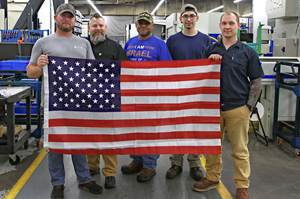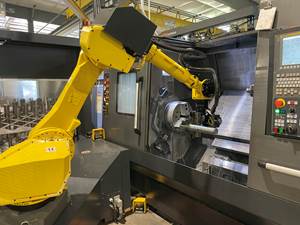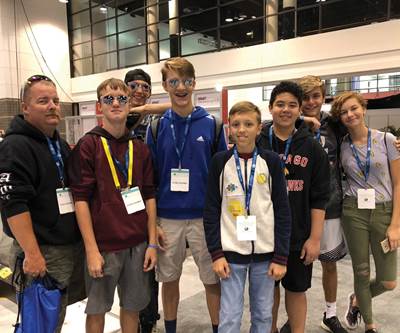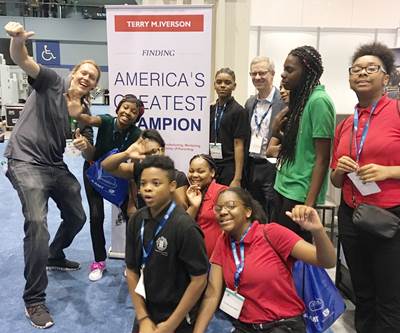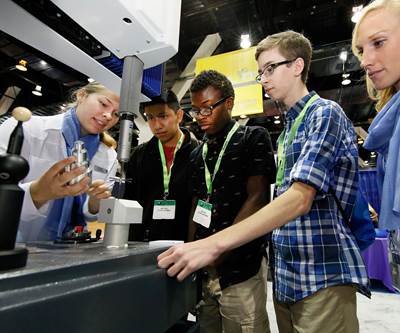Share



Autodesk, Inc.
Featured Content
View More



Takumi USA
Featured Content
View More



.png;maxWidth=45)
DMG MORI - Cincinnati
Featured Content
View MoreLike many of you, I am seriously concerned about the skills gap — a term that basically means there is a higher demand for skilled people than those available to meet this demand. Unless you are a one-person shop, the skills gap is already affecting you, and it will only get worse. This issue is all over the news; all I hear these days is that it is hard to find good skilled employees.
Upon investigation and speaking to many others in industry, I think I may have come upon the reason for this: We are not training enough people to meet the needs of the machining industry. It seems that metalworking trades have seemingly been taken out of many high schools due to budget issues. This is very true where I live.
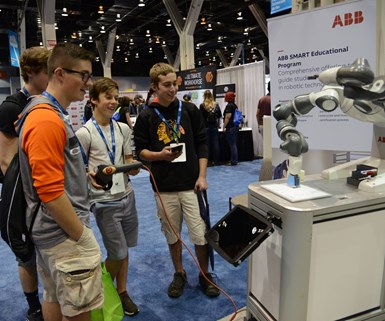
This photo was taken at IMTS 2018 in the Smartforce Student Summit, an area that promotes positive perceptions of high-technology manufacturing to students.
Young people are no longer exposed to metal manufacturing and therefore know nothing about it and its potential. Even their parents do not have an idea of what we do in machining/metalworking. It seems when I speak to people, I find our machining trade has been labeled by images conveying only the dirtiest or most boring/dead-end jobs available. If this is how our industry is being seen, then who would want to make that a career?
The issue is that we are not attracting young people to our industry because it is seen as a dirty, boring, go-nowhere choice. Some of the metal shops that I have seen in the high schools these days would make me feel the same way. Many of them look more like scrap yards instead of metal shops. Many high school metal shops have such low budgets that instructors are forced to scrounge around for material for their students. The state of these classrooms really sets a bad tone.
There is also the illusion that machining is a go-nowhere occupation. It is a mistake to assume that there is no cool future here. The machining industry has been going through ongoing, big changes from all areas. Industry 4.0, automation, robotics, 3D printing and measuring are just a few. These technologies must be learned by the machining industry, and they will continue to expand. Many new technologies that we have not even thought of are on the horizon. The machinists of tomorrow will require ongoing skills learning. They will be a very valuable part of our future society.
I will go so far as to say that the trade/technology of machining is more future-proof than many other skills. Think of what Artificial Intelligence (AI) will do to medical doctors and lawyers. These professions will be severely impacted by computers and AI. We are already seeing it in medical imaging when it comes to diagnosis or diseases and in legal research.
Technology is actually expanding the machining trade.
The point is that manufacturing will require more and more machinists/technologists in the future because of great changes in technology. Technology is actually expanding the machining trade.
Some argue that automation and robotics will replace humans in manufacturing. This is true in some sense if you only look at repetitive work for low-skilled labor. High-skilled labor like machinists will only be increasingly required to run and maintain this automation.
In the end, I am hoping that we begin to realize that we need to emphasize metal working/machining in the high schools so that we can get more young people into the field. We must also educate their parents since they are the great influencers in the future of their child. The future in machining is a good one. It is one of those skills that is being enhanced and not made obsolete.
We, as members of the manufacturing community, need to begin to educate our communities about what we do and its importance to our country’s future. We must help get manufacturing back into the high schools so that students will find it a desirable career path instead of vocation of last resort when all else fails. Machining will give young people a future and maybe solve the skills gap that we are facing. That is how I see it from the shop floor.
Related Content
Finding the Right Tools for a Turning Shop
Xcelicut is a startup shop that has grown thanks to the right machines, cutting tools, grants and other resources.
Read MoreFinding Skilled Labor Through Partnerships and Benefits
To combat the skilled labor shortage, this Top Shops honoree turned to partnerships and unique benefits to attract talented workers.
Read MoreManufacturing Madness: Colleges Vie for Machining Title (Includes Video)
The first annual SEC Machining Competition highlighted students studying for careers in machining, as well as the need to rebuild a domestic manufacturing workforce.
Read MoreSame Headcount, Double the Sales: Successful Job Shop Automation
Doubling sales requires more than just robots. Pro Products’ staff works in tandem with robots, performing inspection and other value-added activities.
Read MoreRead Next
Students Experience the Manufacturing Classroom of the Future
As the future of our manufacturing workforce, it’s important for students attending the Smartforce Student Summit to understand what technologies they will be working with once they enter the workforce.
Read MoreBe a Champion for Manufacturing
Terry Iverson, president of Iverson and Company and founder of ChampionNow!, is working to change the perception of manufacturing in the United States by writing a book for parents, mentors and educators. The goal is to highlight the quality manufacturing career opportunities that are available to today’s youth.
Read MoreRobotics, Smart Manufacturing Engage Students and Educators at Summit
Every edition of the IMTS Smartforce Student Summit features new and exciting opportunities for students and educators in science, technology, engineering and math (STEM) and this 11th edition is no exception.
Read More






.png;maxWidth=150)




























